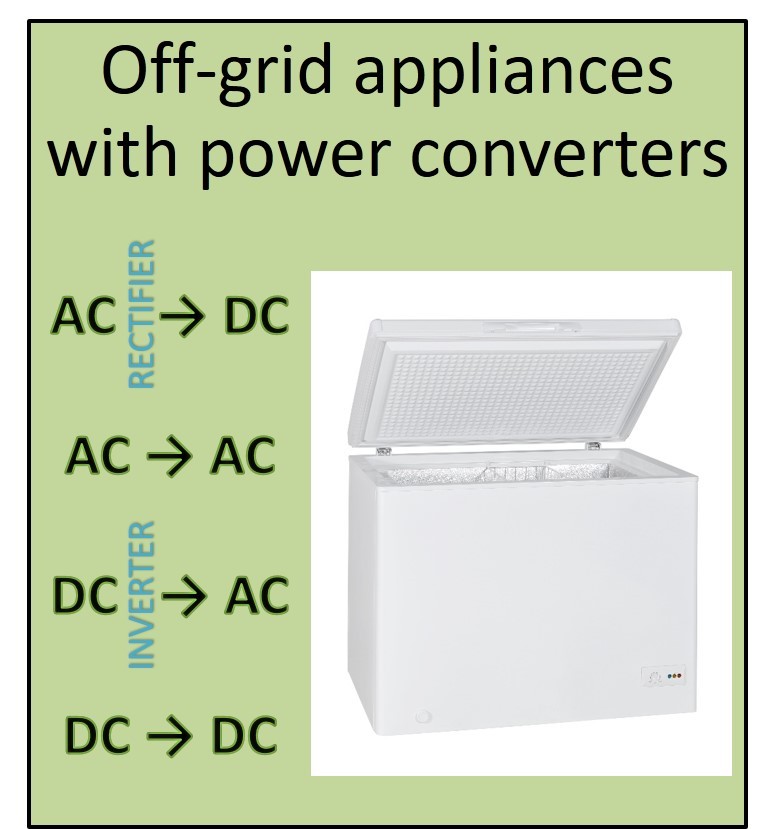Off-grid appliance testing and evaluation

Access to cooling is considered the norm in developed countries. However, in developing countries, many people still do not have access to a refrigerator, and this can have a significant impact on their quality of life. Refrigeration enables food to be stored safely and for longer periods, reducing food loss and providing greater flexibility to people’s lives. Refrigerators that are available are not always efficient and issues exist with their use in remote locations where the electricity grid may be poor.
RD&T have recently been involved in work with CLASP, the Energy Savings Trust and UK Aid to examine issues with off-grid refrigerators.
Electrification in developing countries involves a mix of AC grid, AC or DC mini-grids or AC or DC solar systems. Both AC or DC appliances can be used on these grids and where the power supply and appliances are not compatible, users need to use an inverter to convert DC to AC or a rectifier to convert AC to DC. Using a power converter adds additional power consumption, cost and complexity.
In part 1 of the study, RD&T tested a number of appliances in native mode (using the appliances’ rated power supply) and non-native mode (where power was converted from an incompatible power supply by using a power converter). Tests were carried out in a laboratory according to the Global LEAP Awards Refrigeration test method (Efficiency for Access Coalition, Global LEAP Awards refrigerator test method, 2019). Four AC refrigerators were tested initially in native mode. They were then tested using a DC supply and a range of inverters of different costs and with different wave forms. It was found that the DC supply needed to have a 3 kW maximum rating to be able to deliver the inrush current to the appliances. This was much higher than initially anticipated. An inverter compressor tested in part 2 overcame some of these issues. In all cases energy consumption was higher when the appliances were tested in non-native mode than native mode. Tests were also carried out with under and over voltage to simulate the conditions in poorly controlled grids. The operation of the inverters was quite variable with the Pure Sine Wave (PSW) inverter performing much better than Modified Sine Wave (MSW) inverters. In particular, issues were found with the very low price MSW inverter, which was unable to power the appliances adequately. Other tests (in another lab) were carried out using DC appliances operated from an AC supply. No reliability or performance issues were identified with the rectifiers used. However, the extra energy required for the power conversion was found to be significant if the rectifier was of low quality, or not appropriately sized.
In part 2 of the work multiple appliances (refrigerator, fan, TV, LED lights, mobile phone charger, sewing machine, hair clipper and drill) were tested in another laboratory operating on a single inverter or rectifier. Results showed that systems with DC appliances had lower overall cost compared to AC appliances operating using an inverter. In tests the refrigerator was the major energy consumer and so efficiency for such appliances is very important. Running multiple AC appliances (as opposed to a single appliance) on an inverter improves the cost effectiveness of the inverter, as the surge current of multiple appliances are unlikely to coincide. If a lower cost inverter is selected, short term costs can be lower than purchasing DC appliances. The energy required to operate the appliances in native mode could be provided with a solar photovoltaic (PV) array of around 420 Wp and battery capacity of around 200 Ah. If AC appliances were used with an inverter it was estimated that a PV array of around 750 Wp and battery capacity of around 350 Ah would be required.
The reports are available for download from the following links:
Performance and Efficiency of Off-Grid Appliances with Power Converters, August 2020: Phase 1 – Single Appliance Testing of Refrigerators, TVs And Fans
Performance And Efficiency of Off-Grid Appliances with Power Converters, October 2020: Phase 2 – Testing Of Multiple Appliances and an Inverter Compressor Refrigerator
If you would like further information on the work or testing of on- or off-grid appliances, please contact Alan Foster at RD&T (alan.foster@rdandt.co.uk).